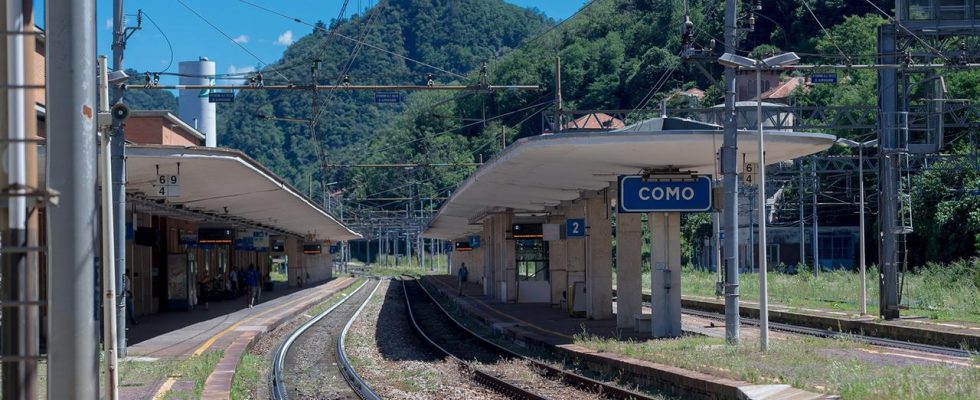background
The environmental conscience of people in Germany is growing. The railways should benefit greatly from the traffic turnaround. But if you want to travel abroad by train, it is usually complicated and expensive.
“More than 21 million people took the train across a German border in 2022,” Deutsche Bahn announced this month – more than ever before. But what is this number worth? For comparison: in the same period, almost 150 million people crossed German borders by plane, i.e. seven times as many. And even long-distance bus transport transports a good 16 million travelers abroad.
Deutsche Bahn would like to change that in its favor and is currently expanding its long-distance travel. Much too slow, say traffic experts. Environmental awareness is just one motivation for using the train, says Philipp Kosok, project manager for public transport at the think tank Agora Verkehrswende: “But other factors such as travel speed, a direct connection and of course the price are decisive.” Especially with the direct connections it looks bad. And that brings the traveler significant disadvantages.
Four tickets on the way to Barcelona
The experienced train driver Detlef Neuss, national chairman of the Pro Bahn passenger association, wanted to go to a conference in Barcelona and describes his experience as follows: “Ticket number one: we travel from Mönchengladbach to Aachen. Ticket number two: from Aachen with the Thalys to Paris. Ticket number three: from Gare du Nord to Gare de Lyon. Ticket number four: Gare de Lyon to Barcelona. All tickets were purchased individually online. A continuous ticket cannot be booked.”
The main problem with such bookings: a different, mostly foreign company is responsible for each section. Therefore, the passenger has no continuous passenger rights. If you miss a train when you change trains frequently, the other tickets expire because abroad there is usually a train connection with reservation. The timetables – especially if the destination is not a large city – are not internationally coordinated, so that long waiting times can arise. In addition, buying individual tickets abroad is very expensive compared to continuous routes.
DB Group defends its offer
A railway spokeswoman countered and defended the offer on request: “We cannot understand your statement that ‘the railway offers almost no continuous offers abroad’.” There are even several daily connections on selected routes to Switzerland, France or Belgium, and even a two-hour interval on the Frankfurt-Brussels route. “In cooperation with our partner railways, we serve the great demand for direct connections, especially in metropolises, but also in popular holiday regions such as Austria, South Tyrol or Tuscany.” Deutsche Bahn offers 55,000 travelers 250 direct connections abroad every day.
But if you don’t want to go to Paris but to Rennes, not to Vienna but to Klagenfurt, not to Amsterdam but to Alkmaar, then it becomes cumbersome and time-consuming, traffic expert Kosok from Agora Verkehrswende also confirms. “There are not enough international connections and there is no European booking platform for all train journeys. The European railways are completely inadequately networked when it comes to information and booking. The airline industry has long since solved this much better.”
The rail network is congested and old
But he names the rail network as the main problem. Within Germany, the railway could accommodate travelers from air traffic in the near future. However, the capacity is not sufficient to shift European air and road traffic to rail. “There are currently more trains running through Germany than ever before. Many main routes are full. Passengers notice this from the persistently high delays. We have allowed the network to shrink and age for too long.”
Pro Bahn is therefore calling on Deutsche Bahn and the other European railway companies to improve their service. “We demand the creation of a joint sales system with continuous tickets and passenger rights. But politicians should also become active here and demand and support such a system.”
The train promises improvement
Deutsche Bahn has recognized the problem and wants to continue working on it. “Deutsche Bahn is pursuing the goal of making cross-border travel in Europe on climate-friendly rail even more attractive and convenient for passengers,” explains the railway spokeswoman. “That’s why we’re constantly working on expanding the range of tickets for cross-border trains. We’re also very successful at that, never before have so many international connections been bookable online with DB as today.”
But there are not only gaps in ticketing, there are also holes in the offers themselves, which is why Deutsche Bahn became part of the “European night train alliance”. Here, Deutsche Bahn sometimes falls back on foreign providers and explains it like this: “In the competition of the railways with cars and planes, team players are needed instead of lone fighters. And it needs specialists, for example those of the Austrian Federal Railways (ÖBB) for the rolling stock. We provide Train drivers and locomotives organize the use of routes, stations and energy and play a decisive role in sales.”
All of this, however, does not really put comfortable and inexpensive rail travel throughout Europe within reach. Agora expert Kosok therefore has an alternative worth considering for train fans. He asks: “Why not go the other way around and choose the destination based on the connection. Especially since Berlin and Munich have developed into European centers of night train traffic, there are more and more exciting destinations that can be reached from there overnight without having to change trains .” Good at least for all those who let others decide where to go on vacation.

